Some mornings the Green Point bus becomes a submarine, others it’s navigating the African savanna on safari - it all depends on Owen, one of the children in Green Point’s Outside School Hours Care (OSHC) program.
Daily transformation and storytelling support Owen in transitioning from Green Point to school on a daily basis.
“When Owen came, he really struggled with communicating about his emotions and we would just see these big dysregulation moments, where he would try and evade,
run away from the service or become very aggressive,” says Green Point’s Director, Kellie Bruce.
After tracking what was happening for Owen, Kellie and her team realised that his biggest triggers were the transitions he encountered on a daily basis.
Owen’s everyday transitions included separating from his parents in the morning, settling into Before School Care, moving onto the bus, settling on the bus, then into School.
Kellie says it was the modules that make up Be You’s Professional Learning and Fact Sheets that led Green Point’s learning community to develop and apply strategies to help Owen and other children experiencing similar challenges.
“Having access to Be You modules, particularly around transitions, has helped me and our educators with ways of supporting children, and also understanding why transitions can be quite challenging for them throughout the day.”
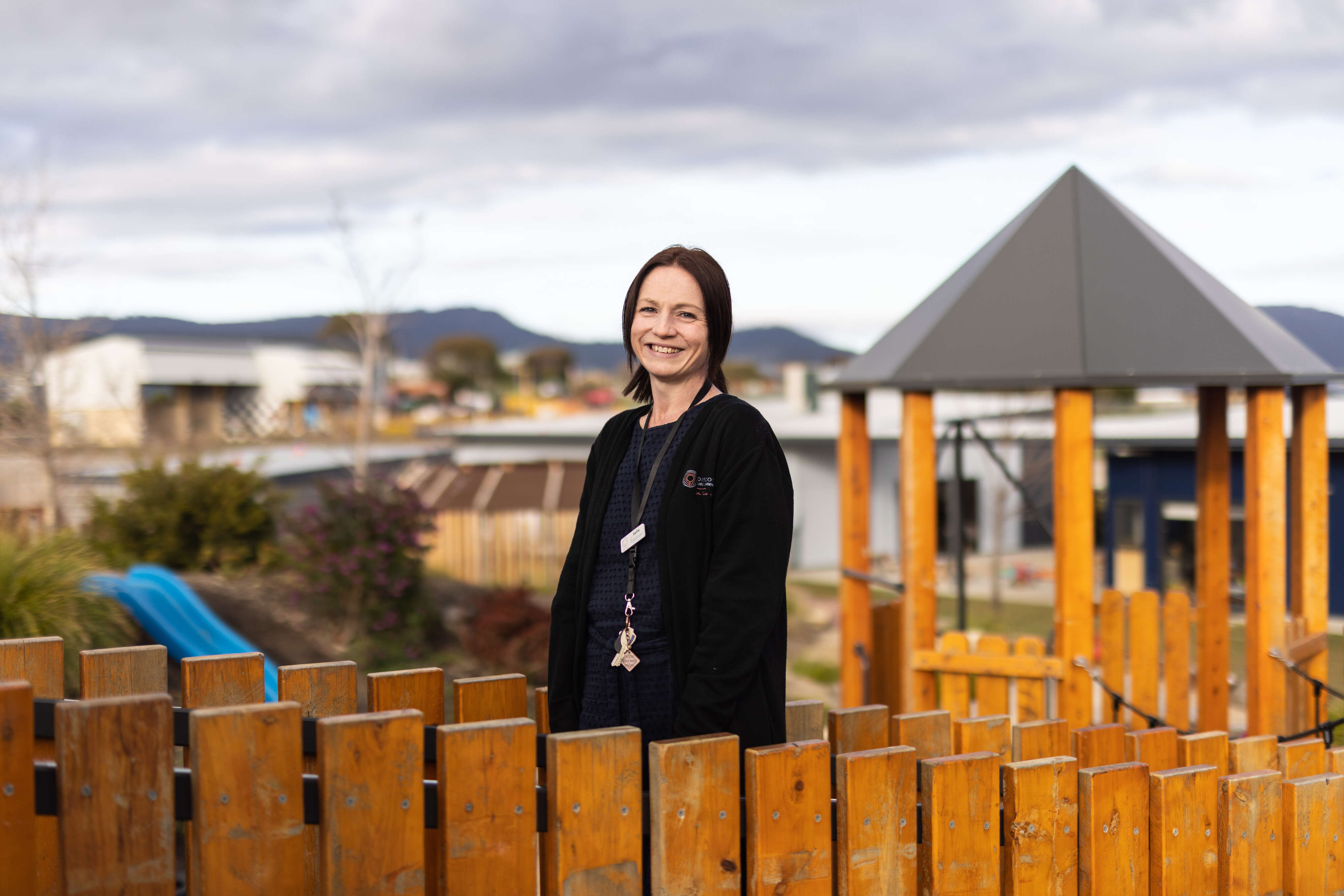
Green Point Director Kellie Bruce.
Tash and Owen's relationship
One of those educators is Tash Keleher. At Green Point, she’s Owen’s safe person. As well as providing a predictable morning routine for Owen when he arrives at Green Point to help himself regulate, Tash travels with Owen on the bus to School.
It’s Tash who discovered how to harness Owen’s imagination to make that transition easier for him.
“We get on the bus and ask Owen, ‘Where are we going?’ and he will tell us we are going on an underwater adventure or to outer space,” says Tash.
“He will come up with the whole journey.”
With the bus ride identified as one of Owen’s most challenging transitions, the strategy has had a big impact.
“Quite often when it was time to go to school, we’d see Owen refusing. He wouldn’t come and get his bag, he’d hide under tables. He just didn’t want to go. He’d already had the transition of coming into care and now it was another transition," continued Tash.
“Now he’s much happier and he’ll come and get his bag, get on the bus and tell everyone else what we’re doing.”
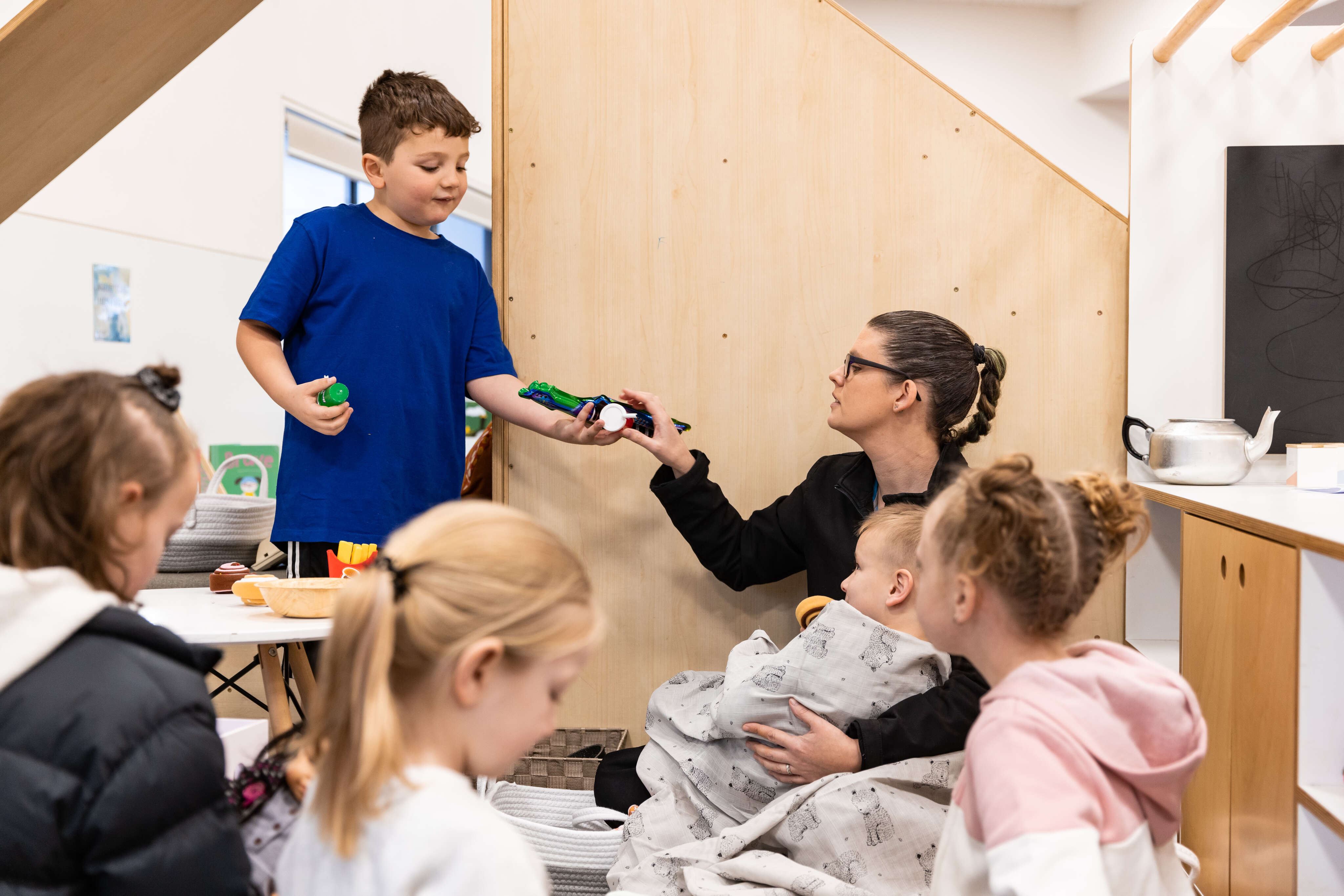
Green Point Educator, Tash Keleher, talks with Owen.
Supporting self-regulation with the help of Be You
Be You has also highlighted the need to consider and teach self-regulation skills in supporting transitions for Kellie and her team.
“One of the biggest things I’ve learned is that self-regulation isn’t an innate skill children are born with – they need to learn how to self-regulate,” says Kellie.
Be You provides modules and resources that help educators appreciate the importance of self-regulation and understand how to support and develop children’s ability to do it.
“That’s really changed not only my way of thinking, but also our educators, that children need support and need to be taught how to regulate their emotions” added Kellie.
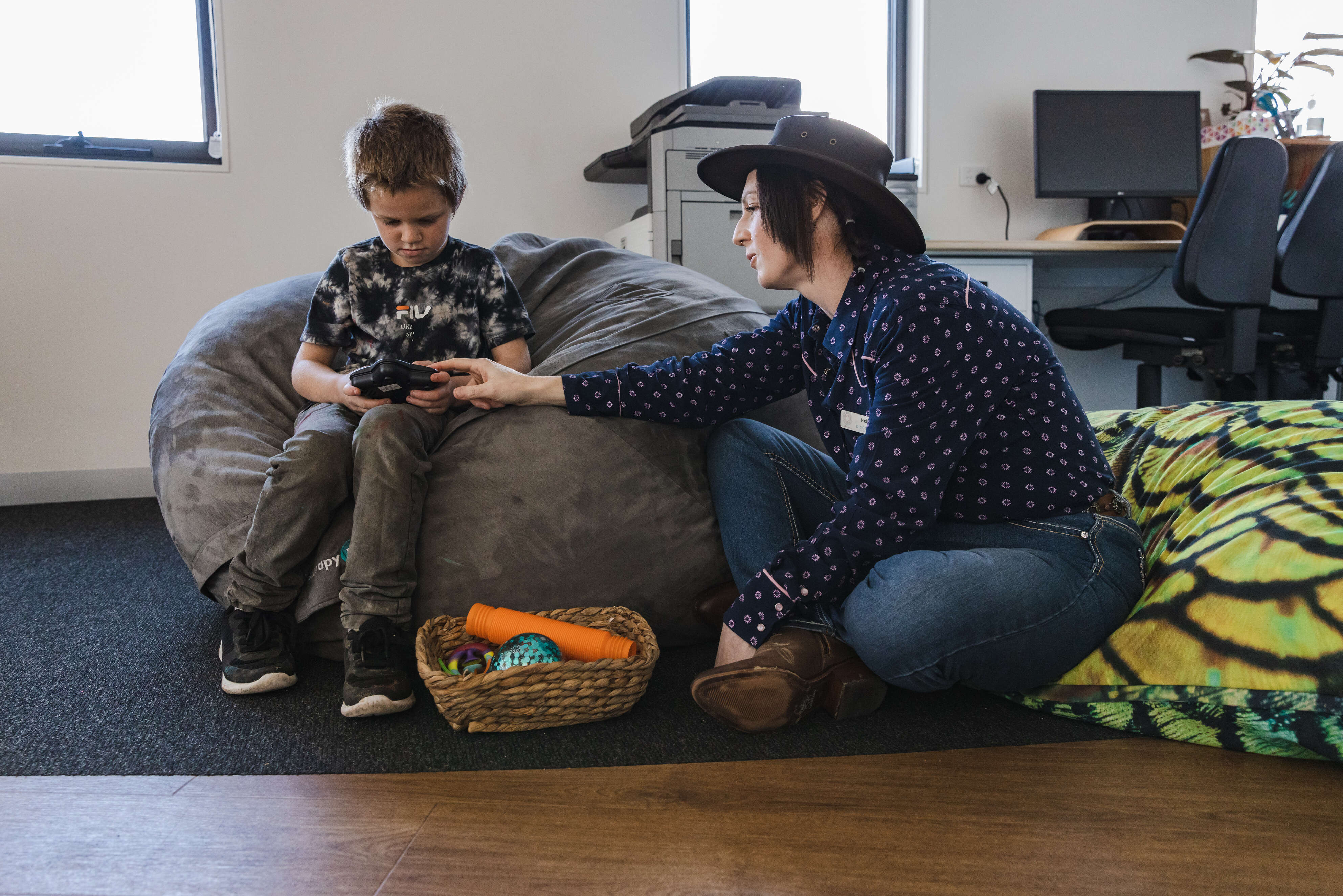
Kellie talks to a child in the cool down zone.
With Green Point welcoming children from birth to five years into its early learning and preschool programs, and four to 12 years into its OSHC, educators are presented with many other opportunities and ways in which to support children.
“We’re really lucky at Green Point that we have a cool down zone,” says Kellie.
“That allows us to provide a space that has no stimulation, because sometimes it’s really hard to regulate when a room is incredibly stimulating and very noisy."
“Having a safe space to remove children to, to co-regulate with an educator or to provide opportunity to self-regulate, depending on what that child needs, is really important.”
Green Point also has a purpose-built OSHC room, and an extensive nature-based outdoor environment which allows for child-led transitions between the indoor and outdoor environments.
“Sixty per cent of the children that attend the Outside School Hours Care program would be classified as vulnerable,” says Kellie.
“A lot of the children are already in foster care or kinship care or their families are working directly with Family Support Services to support them with their parenting capacity. In addition, they have come from hard places and some have medical diagnoses of ASD, ADHD, foetal alcohol syndrome.
“This layers a lot of challenges and dysregulation in the children, in the rooms, and some of those behaviours can be very challenging to face and need a whole team to support them.”
In response to this, at Green Point a Be You Champion has been appointed to help the learning community both embed but also customise the initiative. Her name is Dom Toomey.
“Each of our educators now has time off the floor to work on Be You modules for what they’d like to implement in their room or feel will benefit their room and their families.”
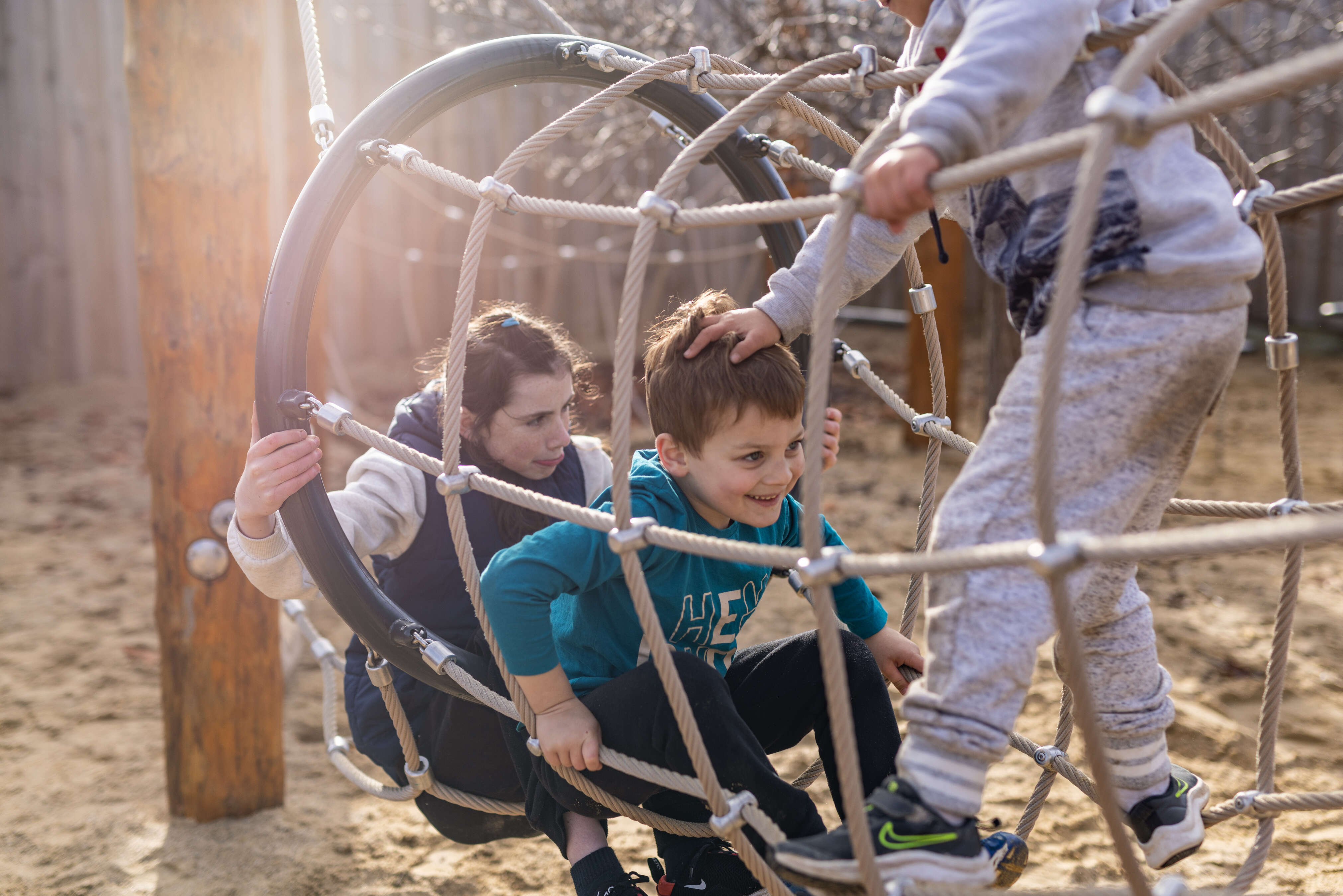
Children play outside at Green Point Early Learning Centre.
Building a mentally healthy learning community
Kaileb Barracu is an OSHC educator at Green Point. He says Be You, as well as Dom’s knowledge and presence, is a treasured resource.
Be You has also played an important role in supporting Kaileb’s relationship with Charlie, one of the children who regularly attends Green Point’s OSHC Care. An energetic child who loves sports, cooking and being active, like Owen, Charlie can find transitions challenging, particularly transitioning from school to After School Care.
He often arrives feeling unsettled and, until recently, that meant he’d remain disengaged from anything that was on offer at the service.
“If you don’t know how to tackle a situation, we can go onto Be You. If I’m having a bad day, I know I can go to the Be You Champion and they’re there to support me.”
“Charlie and I have become really good mates. Our relationship has developed a lot over time, and I’ve definitely become his person, the one he looks up to and the one he looks out for.
“I’ve used a lot of the resources and tools Be You has on the website to implement things with Charlie.
“If he’s had a bad day at school, sometimes he can bring that energy into this centre and it takes time to help him come back and regulate into the setting.
“In cases like that, we go outside, we let him climb. I just let him keep climbing and we have a chat. He’s doing something he loves and I can still talk to him about how his day is, what’s upset him, if he feels like talking.”
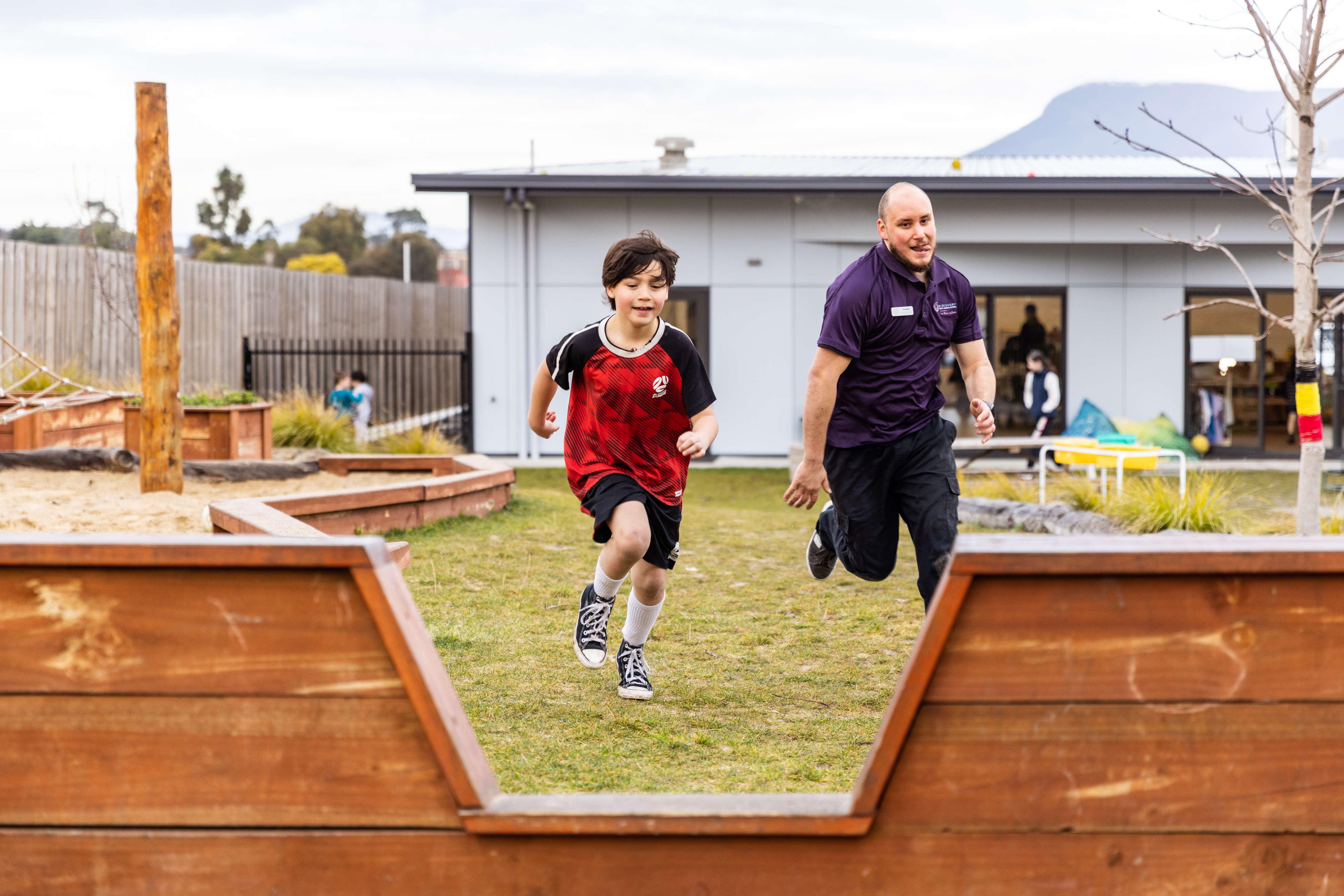
Kaileb and Charlie outside at Green Point ELC.
At Green Point, there’s also a ‘white board system’, where children – including Charlie – are encouraged to make note of the activities they want to do in School Aged Care. Kellie says it’s all about giving children a ‘voice’.
“We believe that’s really important,” she says.
“It helps children feel like they’re being heard and it also ensures that our programs can be spontaneous – if a child really wants to do something, right then and there, that’s okay.”
Given Charlie’s keen interest in cooking, at the beginning of each week, he’s encouraged to research recipes he wants to make and then write them, and a list of ingredients he needs, down.
“Once those ingredients are delivered, Kaileb and Charlie can cook,” explains Kellie.
“Initially it was just the two of them, but now we’re working on inviting other children into that experience as well.”
Feeling empowered using Be You
Having experienced mental health issues himself, Kaileb is particularly passionate about being able to support children’s mental health and wellbeing.
“Because mental health is a big thing, being able to be there for the children is a big thing.
“It’s a pretty good feeling to know that a child does want you to be there and wants you to listen to them and is willing to open up.”
Be You has helped Kaileb keep conversations like that flowing.
“I’ve had a few children come up to me and say that they’re not feeling very welcomed or feeling very loved. Sometimes I haven’t really known what to say or how to go about some of those conversations. Going on to Be You, I’ve found so many helpful tools and strategies.”
Kellie agrees, saying the knowledge she’s gained from Be You has empowered her to have conversations with families about mental health and wellbeing.
“If I’m uncertain about something, Be You gives me a place to go and research. I’m in a very blessed position to be able to support all the children, their families and my educators.”
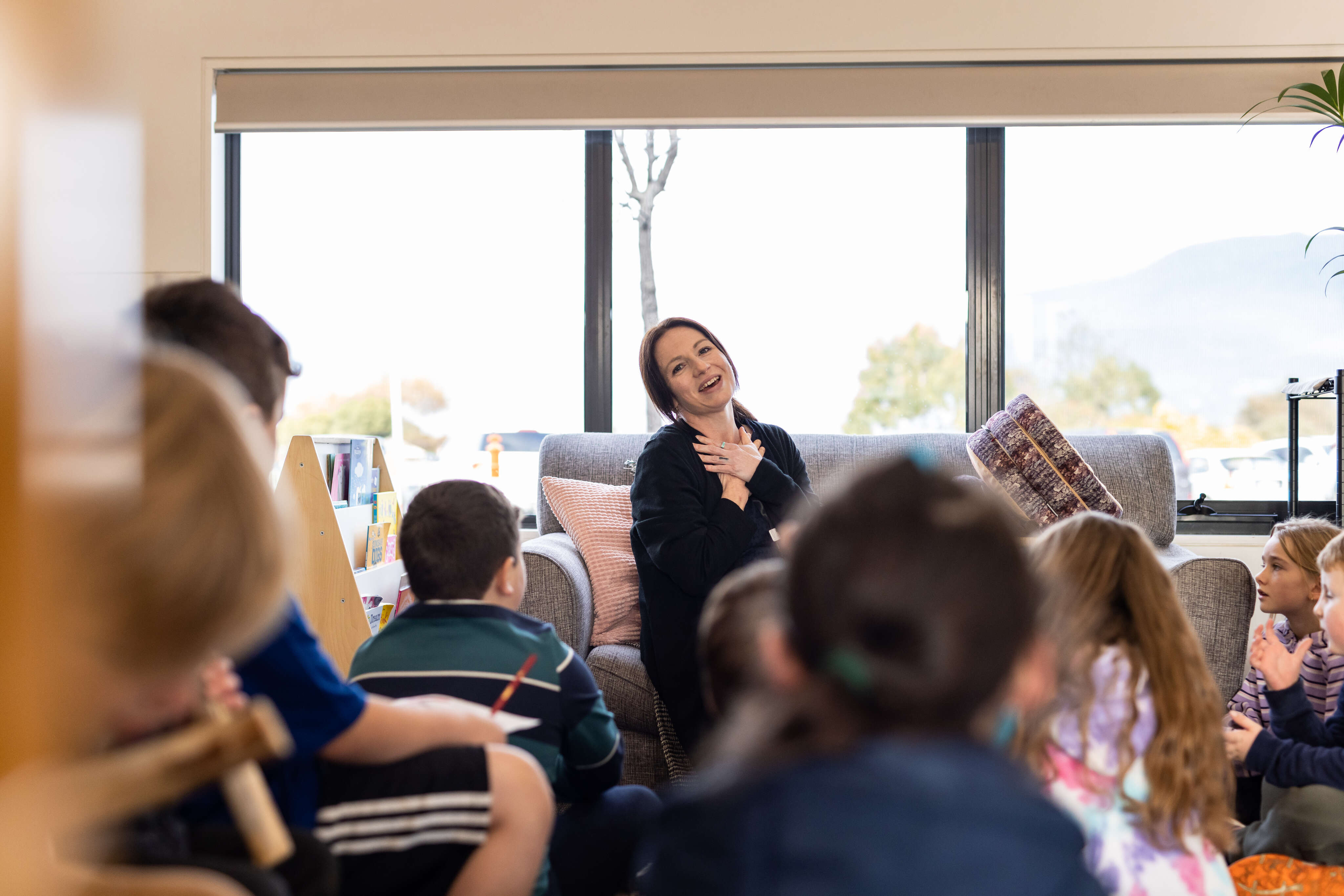
Kellie Bruce chats with children at Green Point.